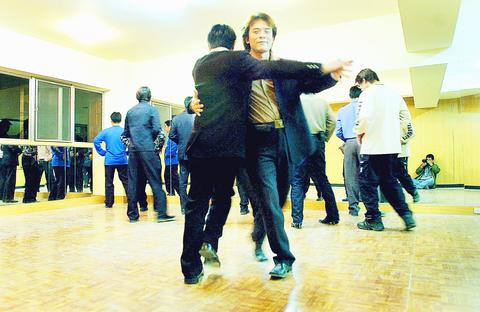After working at two night jobs for more than seven years, Jimmy Lee called it quits and started a brand new life.
"I'm too old to compete with those 20-something kids," said the 30-year-old high school graduate.

PHOTO: CHEN CHENG-CHANG, TAIPEI TIMES
Lee waited tables at various bars for six years and then to startedwork as a gigolo in downtown Taipei City about a year ago.

PHOTO: CHEN CHENG-CHANG, TAIPEI TIMES
His old job, which started at 9pm and ended at 3 or 4am, was fairly easy for him: chatting, drinking, dancing, and entertaining his clients, mostly rich but lonely women aged between 20 and 50.
He charged them NT$600 an hour. He also received tips ranging between NT$500 and NT$1,000 from clients. When business was good, he could put as much as NT$7,000 a night in his pocket, or about NT$200,000 per month.
If his customers were so satisfied with his bar service that they would like to take him out, they had to pay a flat fee of NT$15,000. Charges for staying overnight cost between NT$30,000 and NT$50,000.
"I remember the first client I had sex with was a lonely middle-aged wife whose husband was the manager of a construction company and had little time to spend with her," Lee said.
"She came to see me at the bar almost everyday and tried to get me to sleep with her for two weeks. I declined her offers five or six times before actually doing it. You've got to play with women a little bit before giving them what they want, you know."
Unlike some gigolos who opt for lessons at gigolo training centers before taking on the job, Lee said that he learned most of his tricks while waiting on tables at bars.
"I learned how to please women and make them feel good," he said.
A high tolerance for drinking was not that important, but it was always a plus.
"For example, I could finish a bottle-and-a-half to two bottles of whisky [about750cc], or 10 to 15 cans of beer a night. It was not awfully healthy, but I could get by," he said.
Connections outweighed everything else in breaking into the business.
"Unless you know someone, it's almost impossible to break into the circle," he said.
Lee has four or five high school friends who were in the business and introduced him to the circle. Except for two who are still working, they have taken on normal jobs.
Although Lee could easily rake in NT$200,000 a month, he said he could just as easily gamble away NT$300,000 a night.
"That's one of the reasons that I wanted to quit," he said. "If I hadn't made the move, I might have lost more money in gambling houses."
Another reason was that he was not interested in developing a career as a gigolo.
"I don't want to be a sex slave of some rich, old lady who's willing to support me financially for the rest of my life," he said.
Two of his wildest dreams now, he said, are to open a restaurant and to settle down with the one he loves.
"Although I spent a lot over the years, I managed to save some. I hope to have a store of my own. And I'm serious about this girl I'm seeing," he said.
Commenting on the city's intensive crackdown on the sex industry, Lee said that the initiative sounded preposterous.
"It does nothing more than drive the sex industry underground or elsewhere," he said.
"I think the mayor should pay a personal visit to the night clubs and bars along Linsen North Road and Chunghsiao East Road at night, I bet one night would not be enough to visit them all."
The best way to tackle the problem of prostitution, Lee said, was to legalize the industry and levy taxes.
"Take my previous job, for example. The company's gross revenues reached between NT$15 million and NT$20 million a month. Of course, we were not honest in filing taxes," he said.
They did not have to worry about the city government, because the workplace was a legally registered restaurant. They did not have to worry about the police, either, because they offered the local precinct a monthly "public relations" fee of between NT$100,000 and NT$150,000.
Nor did they have to worry about paying a lot of tax for their high-paying jobs because they filed tax returns for far less than what they earned.
On the eighth floor of a 12-story building in Panchiao City on Friday evening, about a dozen men were awkwardly practicing ballroom dancing.
A-an and Andy were two of the trainees attending training courses offered by the Jie Ni Si Pastime Enterprise Organization (傑尼斯娛樂事業機構) to learn the trade secrets of professional gigolos.
A-an, a 25-year-old salesman who was on the first day of his training program, said that he was eager to try working as a gigolo and dreams of making it big in the business.
"I'm very curious about the job and am interested in making big money," he said, claiming that he had never dated a woman before.
He said that he hopes to have a six-digit monthly income after entering the business. He now makes about NT$50,000 a month and has to pay loans totaling NT$40,000 on his new car and new house.
Sporting a gray suit and black-rim spectacles, A-an said that he has great confidence in his own appearance although he needed more training in dancing, table manners and needs to polish up his entertainment skills.
Andy, a 20-year-old high school graduate, said that he was also lured by money to enter the business.
"I know normal salaries don't satisfy me because I spend a lot," said the young man with blonde-dyed hair. "I'm dying for a second-hand BMW, which might cost me NT$850,000. I've saved only NT$50,000 so far."
He said that although his parents were at first upset by his decision, they eventually gave in.
"I told them that the job is not what they thought it was like. Besides, I'm not going to do anything illegal like robbing banks or killing people," he said.
Standing at 168cm, Andy said that he would like to be 10cm taller, and needs to overcome his shyness to become a popular gigolo.
"Other than that, I think I'm almost perfect," he said.
Trainees enrolled at the courses of the Jie Ni Si Pastime Enterprise Organization have to be between 18 and 40 years of age. Upon completing a one-week preliminary training program, they are introduced to bars, dance clubs, or karaoke parlors if they express an interest.
Education and brokerage fees, ranging from NT$3,000 to NT$20,000, will not be charged until a trainee lands a job.
Yang Tsung (
"I might have a franchise store in Hsintien City pretty soon. Currently, there're three branch offices located in Sanchung, Panchiao and Taipei cities," he said.
The 28-year-old opened the company in April 1999 with the help of his friends who had similar establishments in Taichung City. Previously, he owned a gambling house which lasted for about a year.
Yang said that men need training to become professional gigolos because the market is more competitive than that for prostitutes.
"While a prostitute can make money by simply opening her legs, a gigolo has to make his clients feel emotionally comfortable before they're willing to spend money on him," he said.
Good looks and a young age, however, do not guarantee a gigolo popularity and good fortune.
"The secret is whether you understand women and know how to please them," he said.

FIREPOWER: On top of the torpedoes, the military would procure Kestrel II anti-tank weapons systems to replace aging license-produced M72 LAW launchers Taiwan is to receive US-made Mark 48 torpedoes and training simulators over the next three years, following delays that hampered the navy’s operational readiness, the Ministry of National Defense’s latest budget proposal showed. The navy next year would acquire four training simulator systems for the torpedoes and take receipt of 14 torpedoes in 2027 and 10 torpedoes in 2028, the ministry said in its budget for the next fiscal year. The torpedoes would almost certainly be utilized in the navy’s two upgraded Chien Lung-class submarines and the indigenously developed Hai Kun, should the attack sub successfully reach operational status. US President Donald Trump

Taiwan Semiconductor Manufacturing Co (TSMC, 台積電) is expected to start construction of its 1.4-nanometer chip manufacturing facilities at the Central Taiwan Science Park (CTSP, 中部科學園區) as early as October, the Chinese-language Liberty Times (the Taipei Times’ sister newspaper) reported yesterday, citing the park administration. TSMC acquired land for the second phase of the park’s expansion in Taichung in June. Large cement, construction and facility engineering companies in central Taiwan have reportedly been receiving bids for TSMC-related projects, the report said. Supply-chain firms estimated that the business opportunities for engineering, equipment and materials supply, and back-end packaging and testing could reach as high as

ALL QUIET: The Philippine foreign secretary told senators she would not respond to questions about whether Lin Chia-lung was in the country The Ministry of Foreign Affairs on Wednesday confirmed that a business delegation is visiting the Philippines, but declined to say whether Minister of Foreign Affairs Lin Chia-lung (林佳龍) is part of the group, as Philippine lawmakers raised questions over Lin’s reported visit. The group is being led by Deputy Minister of Agriculture Huang Chao-chin (黃昭欽), Chinese International Economic Cooperation Association (CIECA) chairman Joseph Lyu (呂桔誠) and US-Taiwan Business Council (USTBC) vice president Lotta Danielsson, the ministry said in a statement. However, sources speaking on condition of anonymity said that Lin is leading the delegation of 70 people. Filinvest New Clark City Innovation Park

DEFENSIVE EDGE: The liaison officer would work with Taiwan on drones and military applications for other civilian-developed technologies, a source said A Pentagon unit tasked with facilitating the US military’s adoption of new technology is soon to deploy officials to dozens of friendly nations, including Taiwan, the Financial Times reported yesterday. The US Department of Defense’s Defense Innovation Unit (DIU) is to send a representative to collaborate with Taiwan on drones and military applications from the semiconductor industry by the end of the year, the British daily reported, citing three sources familiar with the matter. “Drones will certainly be a focus, but they will also be looking at connecting to the broader civilian and dual-use ecosystem, including the tech sector,” one source was